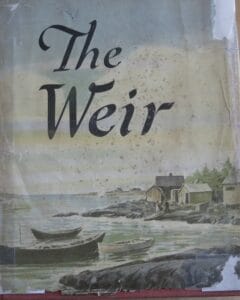Ruth Moore—author, poet, great story teller, and Tremont native—was well known in the national literary world of the mid-20th century. Her novels were often on the New York Times best seller list and her writing has been compared to the likes of William Faulkner. Several of her books were translated into foreign languages—five into German, two into Italian and one into Swedish, and Japanese as well.
Ruth was born July 21, 1903, on Gotts Island in Tremont, Maine. She was proud to be a direct descendant of Daniel Gott, Jr., whose family had settled on the island in 1789. Philip Moore, Ruth’s father, was a fisherman and maintained a herring weir in the island’s pool; he and Ruth’s mother, Lovina (Joyce) Moore, ran the island store and post office (see photo above).
Summer residents living on Gotts Island during Ruth’s youth had a lasting effect on her. The Holmes, Davidson, and Ovington families introduced Ruth to literature, encouraged her to attend college, and guided her to private secretarial/assistant jobs with prominent New Yorkers.
After attending the island elementary school and Ellsworth high school, Ruth graduated in 1925 from New York State College for Teachers in Albany with a major in English and minor in economics.

Interest in Ruth Moore’s work was revived in the 1980s when Gary Lawless, poet and owner of Blackberry Press and the Gulf of Maine bookstore in Brunswick, republished several of her books in paperback and posthumously published her final book of poetry. Her novels are now being reprinted by Islandport Press in Falmouth, including The Weir, Ruth’s 1943 debut novel.
Photo: Helene Tuchman.
Ruth decided teaching was not her calling after one year in the classroom, and moved to Greenwich Village in New York City. She worked at various private secretarial jobs, the most important being secretary to Mary White Ovington, one of the co-founders of the National Association for the advancement of Colored People (NAACP). The Ovington family had summered for many years on Gotts Island. She also worked for the NAACP’s James Weldon Johnson, author of God’s Trombones and helped run a fund-raising campaign. While at the NAACP, Ruth was one of their special investigators; one of her inquiries in Mississippi led to freeing two young black boys charged with murdering a white boy.
From 1932–35 she was private secretary to Dr. John Hayes Holmes, a liberal minister. In ‘36 she became private secretary and assistant to Alice Tisdale Hobart, author of Oil for the Lamps of China. This job took her to Washington, D.C. and later Berkeley, California, where she also managed the Hobart’s fruit ranch.

After returning to New York in 1941, Ruth worked at The Reader’s Digest where, as associate editor, she condensed other people’s books. Her first novel The Weir was published in 1943 by William Morrow & Co., which published all her novels. Her second, Spoonhandle, published in 1946, was made into a movie, Deep Waters, by 20th Century Fox. Ruth was hired as screen writer but quit when the book’s story was drastically changed. The proceeds from selling the book, however, enabled Ruth and her partner Eleanor Mayo to buy property in Bass Harbor, and build a home where they lived out the remainder of their lives. Ruth went on to publish 12 more novels and three books of poetry.
Ruth Moore died in 1989. She left behind a single sheet in her typewriter with a single line: “I have seen horizons…..”

~ Header Image: “Home of Philip Moore, Gott’s Island,” Tremont Historical Society…view item

